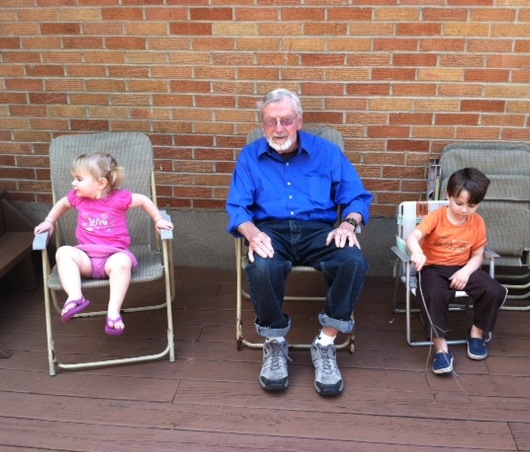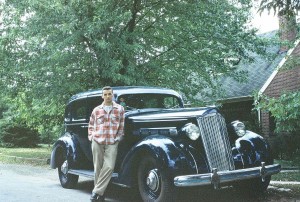
A disease has jumbled them, like a terrible tangle of cassette tape, mercilessly unwound.
Every story he tries to tell starts with going up the hill: everything is up the hill. “So, we went up the hill . . .way up, way up the hill,” he’ll say. “You know, the hill?” he’ll ask my mom. He gestures desperately with his hands: up, up, up.
Usually it’s six different stories that span 50 years, all combined into that hill, but my siblings and my mom and I pluck the stories out for him: “That’s right, Dad. You and mom built this house on the top of the hill, and there were hardly any other houses around yet. You picked this hill and you had this house built, and you raised seven kids here.” ¬†(The above picture of him and my kids was taken a few weeks ago on the deck he once built.)
Or, “Yes, Dad, you worked at Merrell: when you got out of the Army, your friend, Don, told you to go see about a job there. You went up the hill to find out about the job. And you got the job. And you worked there 40 years.”
I love the hill, and I hate the hill. I love that it’s a storytelling mechanism for him. It’s something he has. But I hate it too, because it’s shit. It’s shit to only be left with a jumble of stories on a hill after 81 years of life.
 When the Best Thing is Out of Reach
For the past few weeks, I’ve been collecting old pictures for a photo collage I’m making for my bedroom wall. It’s a little bit about being crafty and indulging my passion for vintage crap. But mostly, it’s because I’ve become obsessed with my dad’s youth. I hold the pictures and stare into his 20-something eyes. The stories are there, in those eyes. How could they be gone? How was the hill allowed to take over?

If your story is your best thing (what I market myself around as a writer), then what happens when you lose your stories? What happens when you reach for your best thing, and it’s there in the distance, but too far out of reach?
I think what happens is that other people step up and hand it to you. “Yes, Dad, we took that camping trip in Shenandoah, and the van quit, right in the middle of the hill. You went up the hill to find a mechanic, and you came back with him, and you made it all right. We always knew you could fix any situation.”
I want to wake up every day in a room filled with these stories. And my collage is going to be fantastic (thanks to much inspiration from Pinterest), with snapshots of my mom and dad in their prime, pictures of my dad’s beautiful cars (the above is a Packard from the 40s that he bought circa 1954), vintage illustrations, swatches of fabric stretched on canvas, and anything else that makes me happy that will fit on the wall.
I need these stories in my house. I may not know all of them, but I have to give them more than a confused hill. I have to let them breathe somewhere. It’s the only way I can deal with my sadness: to make something beautiful that honors the past I only barely know.
I realize that in this newsletter, I usually try to make some sort of a point about understanding your customer or making your copy better. You should definitely keep doing those things. But this week, my brain isn’t there. This week, I’ve got nothing like that for you.
But I have this advice: be grateful for your stories. Love them, tend them, and share them with the people you care about.
Want to sign up to receive these weekly posts via email? Look over to sidebar on the right! Get the first chapters of my ebook when you sign up there. Or, browse past articles and sign up right here
Comments
Posted by People In Cars Getting Ideas | judiketteler.com on 10/24/12 3:13pm
[...] hot dog or not, no topic materialized. So FC finally asked me: what was my favorite newsletter? “A Story About the Hill,” I said, because it was gut-wrenching and amazing to write, even though it didn’t really have [...]

